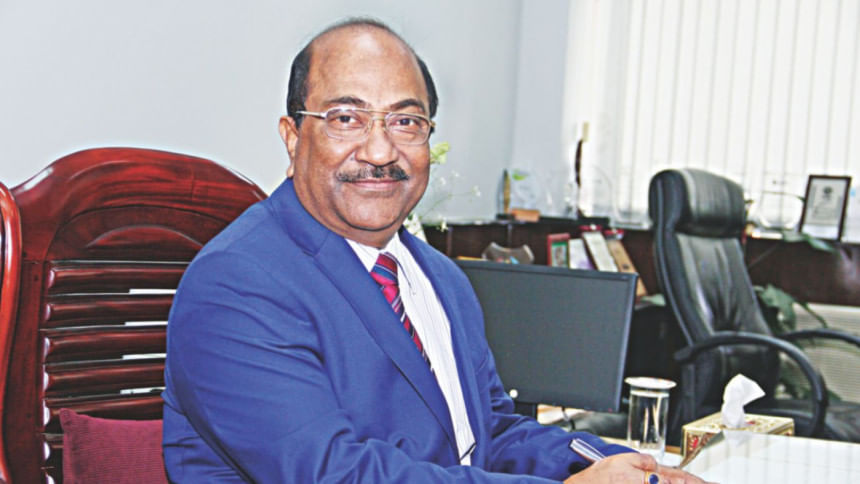Good governance key to higher economic growth

Governance in the financial sector is crucial to steering the economy towards a higher growth trajectory in the long-term, said a top central banker.
Shitangshu Kumar Sur Chowdhury, deputy governor of Bangladesh Bank, said a low level of development in a country is possible even if institutions are weak.
“But for the long term, corporate governance of the financial sector becomes a key element for growth.”
The economy is well on track to achieving the middle-income country status by 2021, said Chowdhury. He has been with Bangladesh Bank for more than 30 years now, having a wealth of experience in key central banking areas including banking regulation and policy, financial institutions and markets, agricultural credit, forex reserve and treasury management.
He lauded the agriculture sector, small and medium enterprises and retail initiatives as the engine of the growth. “Our growth, therefore, is inclusive in nature.”
The deputy governor reflected on the deteriorating portfolio of the state banks and portfolio problems of the private banks that resulted in non-performing loans (NPL) of an average 10 percent in the past couple of years.
The issue of NPL is not a new phenomenon in Bangladesh. In fact, the country has been carrying the NPL legacy from the very early stages of its independence, he said.
“We began with a financial sector regime with fixed interest rates and directed credit. This is not to underplay the gravity of the issue. True, there are failures on the part of the banks to contain and lower the NPL level, but it would be unwise to take away the focus from many other external factors associated with it.”
The inability to pay instalments due to project failure, weak infrastructure, delay in receiving export proceeds, lingering money suits against borrowers, political instability, unexpected financial downturn, and the culture of borrowers' unwillingness to repay also contributed to the NPL, according to the deputy governor.
The central bank is working on two broad perspectives to establish an enabling environment for proper management of NPLs. It has put in place conducive laws and regulation and beefed up supervision, monitoring and inspection.
“We are now considering the introduction of a movable collateral registry and widening the availability and scope of credit information. While significant progress has been made in dealing with NPLs, we firmly believe that a lot more can be done by exploring new and innovative approaches.”
Many analysts think the current monetary policy is a conservative one. But Chowdhury said BB thinks the credit growth set for the private sector is sufficient to accommodate the projected GDP growth of 7.2 percent.
“Therefore, Bangladesh Bank's stance on private sector credit is not conservative at all.”
The central bank has set a limit on monetary expansion at 15.5 percent for 2016-17, considering a higher GDP growth of 7.2 percent and moderating inflation at 5.8 percent. Private sector credit growth has been set at 16.5 percent, much higher than the target of 14.8 percent in the previous fiscal year.
On declining remittance, the central banker said the slide is not permanent.
“We are putting in our best efforts to upgrade our financial sector architecture, to smoothen the process of remittance flow to beneficiaries.”
The central bank has rigorously discussed the matter with the banks and mobile financial service providers to integrate their structures and facilitate the easy flow of remittance to beneficiaries at lower costs.
He touched upon the topic of the government forming a sovereign wealth fund with Bangladesh Bank's foreign currency reserves and finances from multilateral donor agencies. Bangladesh needs to invest in infrastructural projects to reduce the huge gap, he said.
Poor infrastructure adversely affects growth-stimulating indicators such as foreign and domestic investment, the business ecosystem, consumer confidence, employment generation, and connectivity and trade, he added.
He referred to the World Bank's 'Ease of doing business' ranking where Bangladesh came in at 174 out of 189 reporting countries in 2016.
“The cost of doing business is high in Bangladesh, and most of the problems can be attributed to the poor state of infrastructure.”
“Given the huge infrastructure investment need and the low rate of return on our foreign assets, it would be worthwhile if a certain part of the foreign assets can be utilised to fund domestic infrastructure projects.”
He also said the expansion of microfinance institutions (MFIs) in Bangladesh has addressed the question of financial inclusion well but issues of level playing field are yet to be resolved.
Chowdhury said micro-borrowers' graduation from small to medium and large is not easy, and they are yet to be integrated in the commercial and specialised banking network.
The borrowing cost for micro-borrowers is much higher compared to clients of commercial and specialised banks, he said.
Micro deposit and micro insurance are two vital instruments for creating a level playing field, he added.
“Introducing savings instruments will reduce the cost of funds for MFIs and the initiation of insurance product will provide a risk mitigation tool. Both of these will help reduce borrowing costs for micro-credit and create a level playing field for all players.”

 For all latest news, follow The Daily Star's Google News channel.
For all latest news, follow The Daily Star's Google News channel. 



Comments